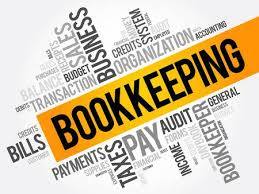
Specialist ACCOUNTANT in Small Charities, SOCIAL ENTERPRISES and VOLUNTARY SECTOR.
BOOKKEEPING SERVICES THAT WORK
Bookkeeping is more about recording the financial data, getting it in order, and getting it into some kind of system. When we do your Bookkeeping this will leave you to concentrate on your day-to-day business and still have useful reports to help with your decision-making.

Our Bookkeeping Service is made up of a number of different elements each set up to ensure that, not only is the information included in your books and records but, that it is complete and accurate.
Completing your bookkeeping processes enables you to produce -
Bank Reconciliation
Reconciling your business bank account each month keeps your bank account, accounting, and taxes, up-to-date.
Reconciling means –
We can identify lost cheques, lost deposits and unauthorised transactions.
Makes sure your bank charges are correct and transactions are posted correctly by your bank.
The ability to detect and prevent fraud from within your company.
Let’s you know how your business is doing by making sure all accounts are reconciled and properly accounted for on your financial statement.
Manage your cash effectively which can help you save money and ensure it makes money for you.
Protect yourself. Timely reconciling allows you to promptly object to your bank about any unauthorised fraudulent or forged transactions presented to your bank and paid by that bank, thus transferring the risk to the bank.
Ensuring you know what free funds you have to allow you to take advantage of those opportunities arising.

Profit & Loss
This is an itemised list of all your revenues which then subtracts an itemised list of all your expenses to come up with a profit or loss for the period.
It allows you to –
Track revenues and expenses so that you can determine the operating performance of your business.
Identify specific items that are causing unexpected expenditures e.g stationery, purchases etc.
Track dramatic increases and trends in revenues or costs.

Balance Sheet
A balance sheet gives you a snapshot of your business’ financial position at a specific moment in time.
A balance sheet helps you –
Get a handle on the financial strength and capabilities of your business.
Identify and analyse trends, particularly in the area of receivables and payables.
Determine if your business is in a position to expand.
Determine if your business can easily handle the normal financial ups and downs of revenues and expenses.
Determine if you need to take immediate steps to bolster cash reserves.
7 Tasks to Do Every Month to Stay Organised
Understanding the ins-and-outs of bookkeeping can help you feel less stressed and earn more. I understand that people don’t think it is an easy thing to do but once you get the hang of it you will wonder what took you so long. It’s a good idea to do this when you are first starting up so that you can understand the basics before things get more complicated.
Even doing the first task, and mastering it every month, will help will give you confidence about your money Here are some simple tasks for you to do every month (or more often if the volume of transactions is high).
1. Use simple bookkeeping software or use excel spreadsheets. My favourite software is QuickBooks and it has different levels depending on what you are doing and how you are set up.
- QuickBooks Self-Employed – if you are self-assessment only and not VAT registered;
- QuickBooks Simple Start – if you are doing everything on a cash basis and are VAT registered;
- QuickBooks Essentials – if you are using giving credit terms and are VAT registered.
Why?
- QuickBooks Self-Employed is used for calculating quarterly taxes, printing financial reports and organizing business income. Or, you could also use a simple spreadsheet to keep track of monthly income and expenses.
- QuickBooks Simple Start has the same functions as Self-employed plus you can Manage Your VAT (MTD)
- QuickBooks Essentials has the added functions of being able to manage bills with later payments as well as multiple currencies.
Whichever kind of method you use; it is essential that you take backups that are then stored somewhere separate from your computer. This way, if your computer or software breaks down you can restore your information without too much worry or stress.
2. Categorise your business transactions
Make sure that you review your bank accounts every single day if possible. (Weekly or at the maximum monthly, if there are very few transactions.) However often, make sure that you build it into your routine and that it is done regularly. Keep in mind, however, that a lot can happen in one day with a business bank account. Keep all of your business and personal bank accounts separate, including your savings accounts and credit cards. This way you’re able to organise all of your business transactions separate from your personal bills. Even if you’re not a Limited Company, and are only a sole-proprietor or self-employed, open a second account and mark it for business-only transactions. Review all of your account balances regularly, so you know how much money you have, and where it’s going.
3. Save and verify receipts
When deducting business expenses, you have to be able to prove that the cost was business related. The best way to do this is by saving and verifying your business receipts regularly. There are multiple ways you can do this:
- Capture pictures of receipts with the QuickBooks mobile app and upload them to your QB account online.
- Store all of your receipts in one box, file or folder to be reviewed every month. Move them to another folder or envelope once they have been categorised and entered.
- Use a scanner, to save all your receipts and link them to the correct expense.
Every week go through all the receipts, verify the amounts and expenses, and pay credit cards & bill for the week/month. All receipts related to your business are put into a folder that is created at the beginning of each year. This makes it easy to save tax-related receipts, income statements from client payments and other documents, that will be needed when taxes are filed.
4. Perform a monthly check-in
Take time to have a quick check-in with your business finances every week. Look at the big picture. Is your income still enough to cover your bills, and pay your quarterly VAT?
Verify all your bank accounts, retirement balances and your debts. Are you making progress, can you afford to pay more and still cover expected bills? Do not miss out on this time, as it’s extremely important for keeping your business running smoothly.
5. Send invoices to business clients
- It’s not always easy to talk about money, or enforcing clients to pay you for work you’ve completed. But it’s a very important part of valuing yourself and your services.
- Set up an invoicing process where you bill clients on a regular basis (at least once a month). Then have automatic payment reminders be sent out if they are late.
- Request that you be paid via PayPal or direct deposit, as those are often the forms of payment with the lowest fees, and wait times, attached to them.
Again, set aside a time during the month to bill out all of your work. And don’t forget to send follow-up emails to clients who are overdue. Making this part of your regular bookkeeping routine will allow you to feel more comfortable with asking for money, as well as increase your cash flow.
6. Set aside money for quarterly VAT
Another important bookkeeping task to do every month is set aside money for quarterly VAT. This ensures you are not building up debt which may not be able to be covered in the future. It’s a good idea to calculate each month instead of waiting until the end of the quarter. Why not calculate your quarterly taxes as you receive the funds, and then transfer it into a separate bank account to keep it separate from the main account? You could also do the same towards saving for possible year-end tax by putting aside about 20% of income.
This way you won’t accidentally spend the money that’s due to HMRC. You definitely don’t want to owe them money.
7. Plan ahead for the next month
At the end of every month perform a quick review of my financial progress and look ahead at the upcoming month. It’s extremely difficult to plan ahead when you have irregular income, but there are things you can do to help ease the inconsistency.
- Create monthly income and expense reports.
- Calculate upcoming bills and expected income.
- Calculate quarterly taxes to make sure you’re on target.
- Do an audit of all business expenses and cut back if they are higher than income.
- Use this bookkeeping checklist at the end of the month.
If you don’t feel comfortable with doing all of these bookkeeping tasks yourself, at least now you know what exactly you can outsource to a VA or qualified bookkeeper.
Start small and work these accounting to-dos into your regular business admin tasks. You’ll be surprised how, just keeping an eye on your money will really help increase your cash flow and your bottom line. The more you know about your finances, the better decisions you’ll make and ultimately be more successful.